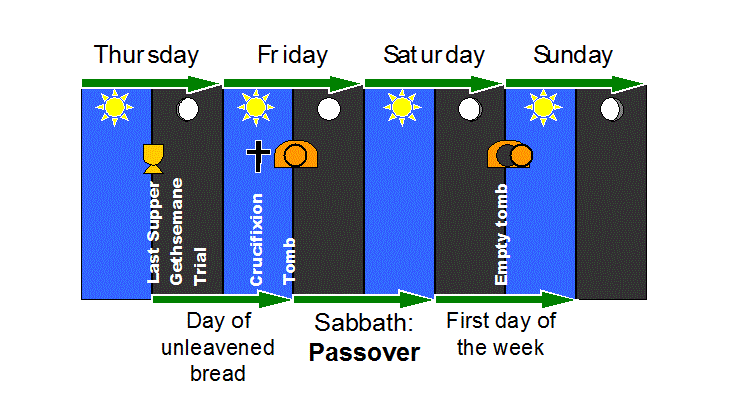The Days of Easter
(C) 2003 R.W.Wills
There is a commonly held view that, when it comes to the events
surrounding Christ’s death and resurrection, the gospel of John
differs from the other three chronologically so that there are problems
reconciling them. I decided to look into this question to see what the
problem really was. I found that in fact the gospels are in good
agreement regarding what happened. If there are problems, these are
more to do with why things happened.
The usual expression of a problem is something like, “Matthew,
Mark and Luke describe Jesus eating the Passover with his disciples,
whereas John says that he was already dead and the priests wanted to
remove his body from the cross before the Passover”. Stated like
that, it seems to be a bit of a show-stopper for the Christian case.
Either John is considered to have his chronology incorrect or, if John
is correct, doubt is cast on the Last Supper.
On reading carefully I find that there is no such difference in
chronology. This is clear when comparing an incident which is carefully
timed in both Luke and John; the burial of Jesus. At this point Luke
(23:54) says:-
“It was Preparation Day, and the Sabbath was about to begin”.
And John says:-
“…it was the Jewish day of Preparation…”
So both are describing the same day. The Day of Preparation, also called the day of Unleavened Bread in Luke 22:7, was the day on which the food was prepared before the Sabbath/Passover.
To understand more exactly Luke 23:54 above, we need to know that in
Jewish reckoning the “day” begins at sunset. So “the
Sabbath was about to begin” means that it was just before sunset
on Friday in our terminology.
After this it’s almost superfluous to note that both Luke and
John say that the resurrection happened on “the first day of the
week” early in the morning (Luke 24:1; John 20:1).
Bearing in mind the day beginning at sunset as already mentioned, all
the gospels show the sequence of events suggested in the diagram below.

So if there are no actual chronological problems, what is the problem?
Basically, the above diagram shows Jesus hosting the Last Supper,
which he described as the Passover in Luke 22:8, on the wrong day.
He and his disciples shared the bread and the wine on what we would
call Thursday evening, whereas the proper time for the Passover was
Friday evening.
Why? For a Christian, believing that he had foreknowledge of what was
about to happen the next day, the simple answer is: because he knew it
would otherwise be impossible. This gives an extra emphasis to his
words in Luke 22:15, “I have eagerly desired to eat this Passover
with you before I suffer”. Moreover, some commentators suspect a
divine plan in that the sacrifice of Christ on the cross occurred at
the same time as the Jews in Jerusalem were killing the lambs for the
Passover feast. (Recall the words of John the Baptist, “Behold
the Lamb of God, who takes away the sin of the world.”) Without
such Christian assumptions, the discrepancy is inexplicable, leading to
the confused view of the gospels we started with. (Surely Jesus as only
a “great moral teacher” would not have claimed the
authority to make such an alteration of custom).
A last question. If Jesus had really chosen to celebrate the Passover
early, why don’t any of the gospels refer to this fact directly?
It’s only possible to speculate. John seems to have bigger issues
in mind and in fact doesn't say much about the meal itself at all. Luke
as a Gentile may not have fully realised what the timing meant; he just
reports what he has learned from others. Did Matthew and Mark as Jews,
in fact disapprove the change or feel uncomfortable with it, wanting to
play it down? If so, their simple recording of the facts without value
judgements says a lot for their reliability as reporters.
Summary: all four gospels have exactly the same chronology for these
few days, even though to some of them it wouldn’t have made
sense, and an incomplete memory would naturally have put the meal on a
different day. Considering that they never had opportunity to compare
notes all together, and in fact details of their accounts show us that
they didn’t, they are showing us the high standard of their
reporting. The order of events (originated by Jesus himself) only makes
sense given Christian assumptions about his purpose and intention.
These all look like reasons to take seriously the more remarkable
following events, when the gospel writers describe his resurrection.
